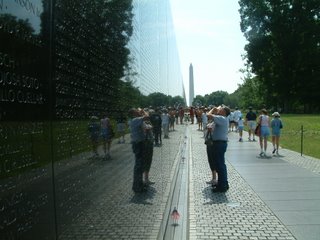
I watched an excellent joint BBC/PBS documentary last night called 'How Vietnam was lost'. It focused on two events from October 1967 that marked a change in mood in Joe American Public's reaction to the Vietnam war.
The first incident was the senior brass' reaction to a poorly planned and messily executed US offensive, which saw two companies ambushed 30 miles north of Saigon. Out of 142 Americans on the patrol that morning, almost 70 were killed, with almost all the rest receiving serious wounds. Yet the story of an American victory was spun and even the Generals presenting silver stars and purple hearts to the survivors of the action refused to acknowledge the truth of the situation.
Stitched around this story was the student occupation and police intervention at the University of Wisconsin in Madison as Dow Chemical - makers of napalm - set up shop to interview graduate recruits on campus. The students, originally intent on peaceful protest, were beaten from the building by club wealding local police who had no sympathy whatsoever with their ant-war sentiments.
Initially, the media and political reaction to the students' actions was hostile. The police may have been neanderthal in ther approach, but it was the students - and the faculty who supported them - who were branded as the enemy of the US.
The contemporary interviews were fascinating. The students and professors come across as erudite, balanced and wise. Almost four decades on, the police officers' necks are still wider than their heads.
The parallels with what's happening in Iraq today were implicit but startling. Whether you're British, American or belong to one of the dwindling number of other nations supporting the coalition, it's hard not to be supportive of our troops on the ground, but easy to question the motives and morality of their being sent there in the first place. Dubya's 'war on turrr' - seems, like Vietnam - to be built on shifting sands and an utterly no-win situation.
Just over a week ago I stood in front of Washington DC's Vietnam War Memorial. Tourists were out in force, so it didn't have the quiet haunting impact I'd expected. But there's something stark and challenging - and entirely unglorious to that smooth reflective wall, etched with 58,000 names of those who never returned. 'Futility' was the word that stuck in my head as I walked away. I hope we're not thinking the same about Iraq a few decades down the line.



No comments:
Post a Comment